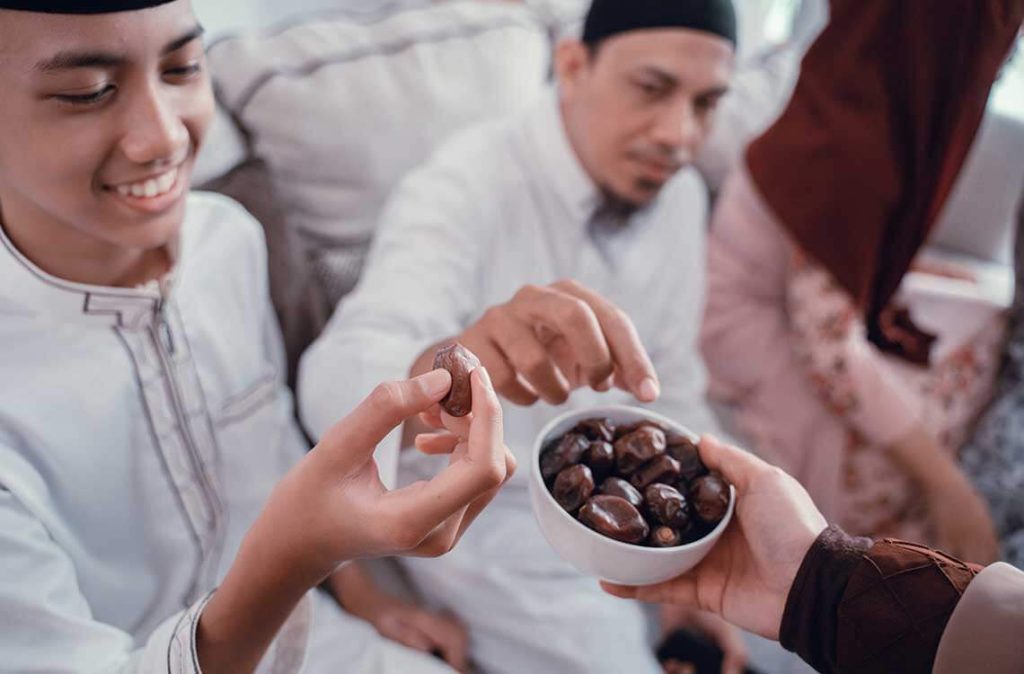Dates (also known locally as kurma) are a quintessential Ramadan delicacy enjoyed by all Muslims around the world. It is almost unheard of to break one’s fast without at least one or two as an appetiser before a full iftar meal.
In some cases, dates transcend culture and tradition, and possess a wide range of nutritional properties that can impart a wealth of health benefits. But how exactly do dates assist Muslims during this blessed fasting month? Read on to find out.
Benefits of Dates for Fasting
They Restore Your Energy
Dates are packed with good carbs, which are your body’s natural energy source. However, despite being full of glucose, dates are a low GI food, thanks to their fibre content. This means that even though they taste super sweet, dates won’t spike your blood sugar levels.
For instance, if you’re diabetic, or just trying to watch your weight, dates are a good sugar substitute. For fasting Muslims, dates restore your vitality, allowing you to complete your Ramadan prayers (tarawih) without feeling sluggish.
If you have a strict fitness regime, dates may be able to help you maintain your exercise schedule even during the Ramadan month.
It is also not uncommon for Muslims to eat dates during suhoor (also known locally as ‘sahur‘), to sustain their energy throughout the day. Being jam-packed with fructose and fibre, dates are indeed a nutritional powerhouse.
They Are Nutritious
For such a small fruit, dates are packed with tonnes of nutrients, every good thing wrapped in an itty-bitty package. Dates contain potassium, magnesium, copper, manganese, iron, and vitamin B6 which are all important for maintaining biological processes in the body.
Dates are also jam-packed with antioxidants like flavonoids, carotenoids and phenolic acid. These compounds help to maintain the health of your eyes, heart and can even prevent certain diseases like cancer and diabetes.
When you’re fasting, you tend to lose a lot of nutrients. Hence, eating dates is like a soft reset for your body. All the important vitamins and minerals are quickly replenished, allowing you to get on with your evening.
They Relieve Constipation
Any change in dietary habits can risk disrupting your natural gastrointestinal pattern. Some studies show, for instance, that fasting can cause constipation. This is partly due to dehydration and less food being consumed throughout the day.
Thankfully, dates, being full of fibre may help with this problem. While not everyone experiences slow or hard stools during Ramadan, they may still benefit from some added fibre in their diet.
When not being used as a constipation remedy, fibre can help lower cholesterol levels, maintain blood sugar levels and even help you live longer.
Fibre also keeps you fuller for longer, which is another bonus when eating dates especially for sahur before you start fasting.
They Keep You Hydrated
Well, assuming you drink lots of fluids in between. Dates are not hydrating in and of themselves, but they do contain lots of potassium.
If you don’t know, potassium is one of the main ingredients in many commercial electrolyte drinks. It helps maintain the body’s fluid balance, allowing you to retain more water throughout the day. This is another reason why dates are a great addition to your sahur menu.
Aside from supplying you with tonnes of energy, dates can also help keep your hydration levels at the optimal state. Just remember to drink lots of water, too.
They Promote Brain Health
Dates may impart some long-term benefits as well when eaten regularly. Some promising studies show that dates may promote brain health.
Dates may prevent Alzheimer’s, stimulate memory, and boost learning ability. This is good news for both pregnant mums and mums with young kids. Those extra nutrients may greatly help brain development in vitro babies and growing children.
Adding dates to your child’s diet throughout the year—and not only during Ramadan—may do wonders for their mental development.
Elevate Your Ramadan with the Prophet’s Favourite Fruit
And there you have it, mummies! Aside from being a ‘sunnah‘, dates are one of the very few ‘miracle foods’ that can do wonders for your health. It’s also an added bonus that they’re teeth-achingly sweet, which makes them a big hit among children.
Despite tasting like candy, dates are also packed with vitamins, minerals, antioxidants, fibre and carbs. These are all crucial must-haves when you’re fasting, to both store and replenish your body’s natural reserve of energy and nutrients.
That said, this does not mean you only need to eat it during Ramadan. Scrumptious dates can be enjoyed all year round and prepared in a thousand and one ways.
Plus they are easy to incorporate in your daily diet; which is all the more reason to start making them a regular addition to your family menu.
Motherhood Story wishes all our Muslim readers a blessed Ramadan!
For more insightful stories and fun recipes, stay tuned to Motherhood Story!
